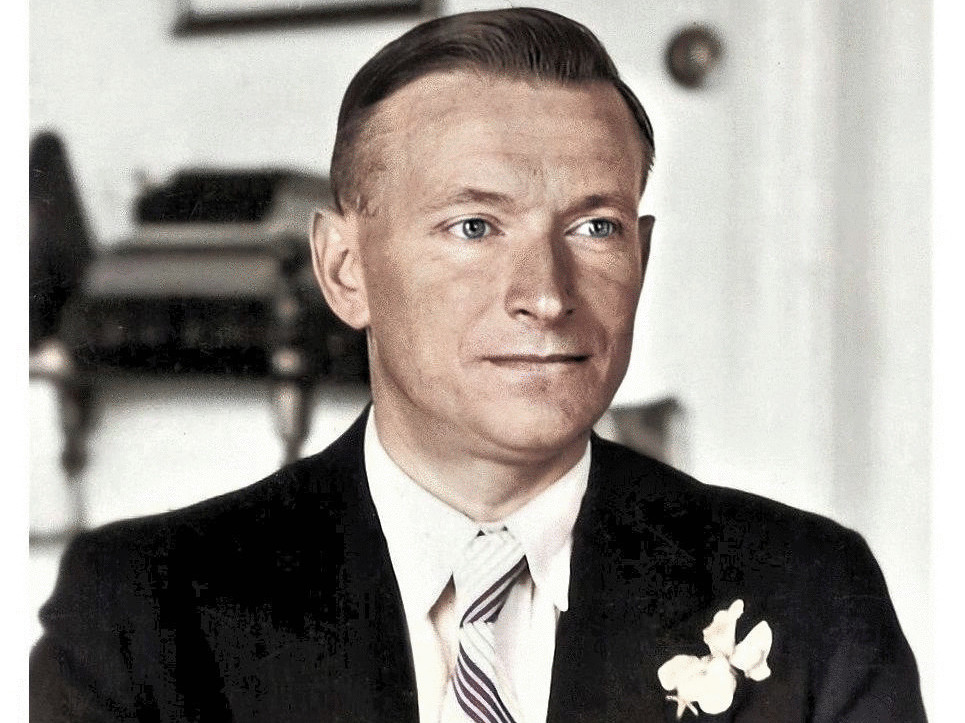
Kārlis Līdaks
(27.07.1893 - 29.06.1942 )
Kārlis Līdaks has composed 59 melodies – 32 or 33 songs for mixed choir, 17 songs for female choir, including a song with a harmonized German folk melody, 9 songs for male choir, 2 solo songs, a trio (for voice, violin and piano), a composition for violin and piano and a composition for piano. Some of Kārlis Līdaks songs are contrafactum, with similar or even identical melody, but different lyrics and/or titles. His best songs typically contain musical thought that is simple and concise, though original enough, with a clear and moderate expression, and impeccable taste. Several of Līdaks' songs were translated into Portuguese, Russian and Ukrainian, and are still sung today around the world.
Kārlis Līdaks was born in Riga on 27 June 1893. He learned to play the violin as a child, and from the age of 14 was already conducting a Baptist Sunday school choir. In 1910, at the age of 17, K. Līdaks took part in the 5th Latvian National Song Festival as conductor of the Āgenskalns Baptist Church Choir in Riga. As a refugee during the First World War, he was the conductor of the Latvian Baptist Refugee Choir in Moscow. On his return to Riga in 1917, Līdaks continued working as choral conductor, also studying violin privately with an Italian professor of music Edmondo Lucini at the Latvian Conservatory. Self-taught in many ways, Līdaks passed exams at the Latvian Conservatory in 1923, and was permitted to teach music and singing. He taught these subjects at the Latvian Baptist Seminary in Riga and conducted mixed choir, taking it on concert tours in Latvia and also abroad. Later, also at the Seminary, he founded and conducted a string orchestra. ln 1927 he founded the Riga Baptist Male Choir, and was the Principal Conductor at the First (1925) and Second (1935) Latvian Baptist Song Festivals. ln 1930 Kārlis Līdaks initiated the founding of the Latvian Baptist Choir Association, and was elected its Chairman from 1930 to 1938 and from 1939 to 1941.
Apart from his devotion to music, on 31 May 1919 Kārlis Līdaks enlisted in the newly formed Latvian Army, and through the years had served as an administrative officer and was promoted up to the rank of Administrative Captain in the Latvian Army. During his career he had held various administrative positions in the Armament and later Supply Departments at the Latvian Ministry of War. When the Soviet Union occupied Latvia on 17 June 1940, Kārlis Līdaks had chosen to stay in the People’s Army of Latvia and later in the Red Army, and was appointed as a finance officer to the 24th Territorial Infantry Corps Headquarters Staff. Later he served as an accounting officer in the 181st Infantry Division Headquarters’ Finance Department. On 15 May 1940 Kārlis Līdaks was promoted to a rank of the Red Army Major. Kārlis Līdaks, like many other former Latvian citizens, was falsely accused by the Soviets of crimes he never committed, and was arrested on 14 June 1941, deported to Siberia and imprisoned in Norilsk. By a decision of the Taimir District Court of the Russian Soviet Federative Socialist Republic (RSFSR) of 23 December 1941, Kārlis Līdaks was sentenced to 10 years in a correctional camp and to the maximum penalty – death by shooting. Kārlis Līdaks was shot on 29 June 1942 in Norilsk, USSR.
On 5 October 1960, the Presidium of the Supreme Court of the USSR adopted a decision overturning Kārlis Līdaks conviction and terminated the criminal case due to the lack of evidence, posthumously rehabilitating Kārlis Līdaks.
Kārlis Līdaka (born Līdaks) MORE HERE
